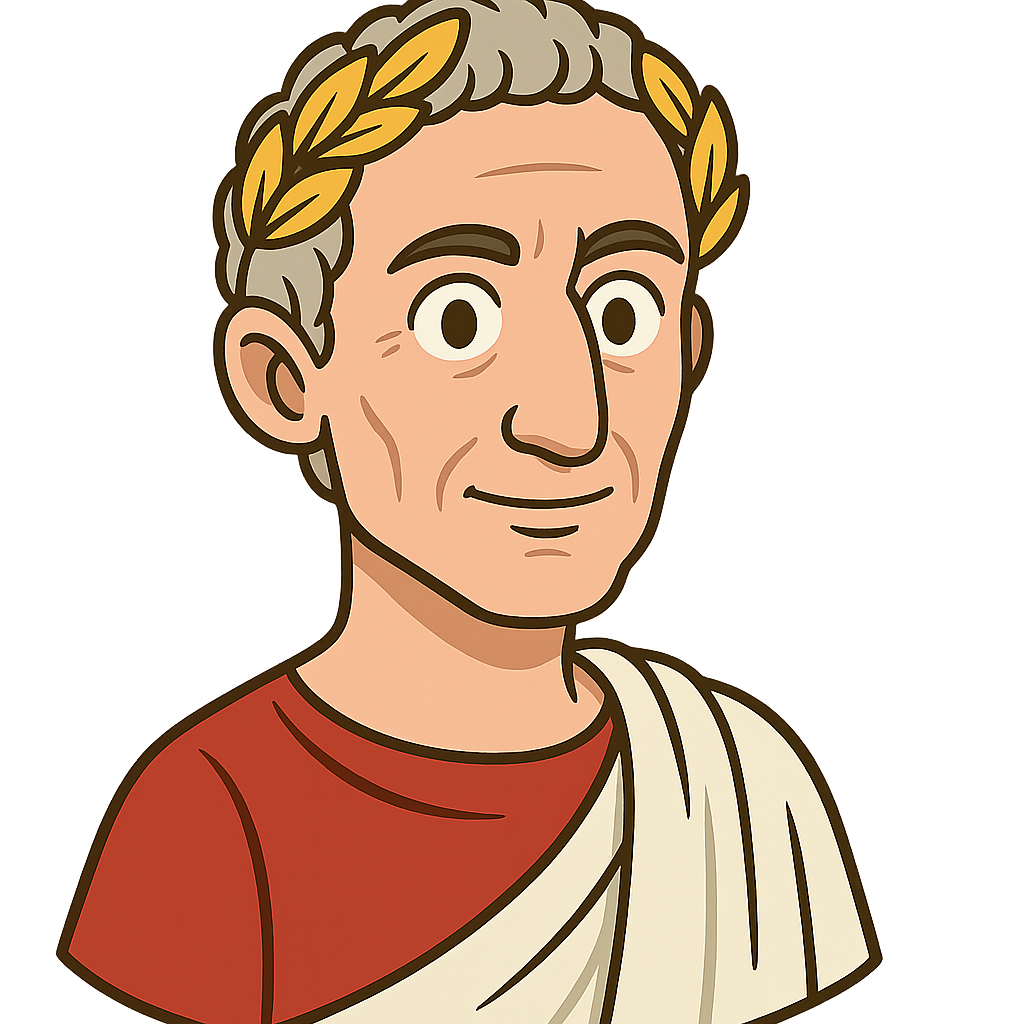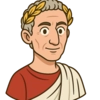My Life as Julius Caesar
Hello, my name is Gaius Julius Caesar, and my story is one that shaped the very course of Rome. I was born in the city of Rome in the year 100 BCE into an old and noble family, the Julii. We traced our ancestors all the way back to the goddess Venus, but even with a divine family tree, we were not wealthy. I grew up in a bustling, crowded part of the city, not a grand villa. From a young age, I understood that if I wanted to achieve greatness, I would have to earn it through my own ambition and cleverness. I was a good student, especially in rhetoric, the art of public speaking, which I knew would be essential for any Roman with political dreams. My early life was not without adventure. When I was about twenty-five, in 75 BCE, I was sailing across the Aegean Sea when my ship was attacked by pirates. They captured me and demanded a ransom of twenty talents of silver. I laughed in their faces. I told them they clearly didn't know who they had captured and that I was worth at least fifty. For thirty-eight days, I was their prisoner, but I acted more like their leader. I wrote speeches and poems and made them listen. I joined in their games but always told them, half-joking, that when I was free, I would return and have them all crucified. They laughed, thinking I was just a bold young man. But once my ransom was paid and I was released, I did exactly what I promised. I raised a fleet of ships, found their hideout, and captured them. That incident showed the world, and myself, that I was a man of my word, unafraid to take command and see a plan through to its end.
Returning to Rome, I was more determined than ever to climb the political ladder, known as the cursus honorum. This was the path every ambitious Roman man followed, moving from one government office to the next, gaining power and influence along the way. I knew that to win the hearts of the people, I had to give them something to cheer for. I spent enormous sums of money, much of it borrowed, to host magnificent public games and festivals. The people loved me for it, but the powerful, conservative senators grew wary of my popularity and my ambition. I realized I couldn't rise to the top alone. In 60 BCE, I made a secret pact with two of the most powerful men in Rome: Pompey the Great, a celebrated general, and Marcus Licinius Crassus, who was fantastically wealthy. Together, we formed what historians now call the First Triumvirate, an alliance that allowed us to control Roman politics. In 59 BCE, I was elected consul, the highest office in the Republic. After my year as consul, I was appointed governor of Gaul, a vast territory that includes modern-day France. For nearly a decade, from 58 to 50 BCE, I was a general. I led my legions through thick forests and across wide rivers, fighting fierce tribes and expanding the borders of the Roman world. My soldiers were incredibly loyal to me because I fought alongside them, shared their hardships, and rewarded their bravery. To make sure the people back in Rome didn't forget me, I wrote detailed accounts of my campaigns, called the Commentaries on the Gallic War. These stories of my victories kept my name on everyone's lips.
My success in Gaul, however, came at a price. Back in Rome, my allies had drifted apart. Crassus was killed in battle in 53 BCE, and Pompey, who had married my daughter Julia, grew jealous of my military glory. After Julia died, our last personal link was broken. He allied himself with my enemies in the Senate, who saw me as a threat to their power and the traditions of the Republic. In early 49 BCE, they delivered an ultimatum: I was to disband my army and return to Rome as a private citizen. I knew this was a trap. If I returned without my loyal soldiers, my enemies would surely prosecute and ruin me. I stood with my favorite legion, the Thirteenth, at the bank of a small river called the Rubicon. This river marked the legal boundary of Italy; to cross it with an army was an act of treason and a declaration of war against my own country. I hesitated for a moment, understanding the terrible weight of my decision. The fate of the world seemed to hang in the balance. Then, I made my choice. “Alea iacta est,” I said to my men. “The die is cast.” There was no turning back. The civil war had begun. My legions marched swiftly through Italy, and many towns welcomed me as a hero. Pompey and the senators fled east to Greece to gather their forces. The war was difficult, pitting Roman against Roman, but my soldiers' skill and loyalty were unmatched. In 48 BCE, at the Battle of Pharsalus, my smaller army decisively defeated Pompey’s forces. He escaped and fled to Egypt, and I followed him. But when I arrived, the Egyptian court presented me with a gruesome gift: Pompey’s head. They thought it would please me, but it only saddened me to see a great Roman brought so low. It was in Egypt that I met the brilliant and captivating queen, Cleopatra. I helped her win her own civil war against her brother, securing her throne and forging a powerful alliance for Rome.
After my victories in Egypt and elsewhere, I returned to Rome in 45 BCE as its undisputed master. The Senate showered me with honors, eventually naming me dictator perpetuo, or dictator for life, in early 44 BCE. I was no longer just a general or a politician; I held the future of Rome in my hands. I set to work on sweeping reforms to fix the problems that had caused so much conflict. I gave land to my veterans and extended Roman citizenship to people in the provinces. I also reformed the calendar, which had become hopelessly inaccurate. The new Julian calendar, with its 365 days and a leap year every four years, is the direct ancestor of the calendar we still use today. I wanted to build a stronger, more stable Rome. But my power frightened many of the senators. They whispered that I wanted to be a king and destroy the Republic forever. A group of them, calling themselves the “Liberators,” plotted against me. They believed that by removing me, they could restore Rome to its old ways. On the Ides of March—that is, March 15, 44 BCE—I went to a meeting at the Senate house. I was surrounded by the conspirators, who suddenly drew daggers from beneath their robes. I was stabbed twenty-three times. The deepest cut was not from any blade, but from the sight of Marcus Junius Brutus, a man I had pardoned and treated like a son, among my attackers. My death did not save the Republic as they had hoped. Instead, it plunged Rome into more than a decade of new civil wars. From that chaos, my adopted son and heir, my great-nephew Octavian, rose to power. He would complete the work I started, becoming Rome's first emperor, Augustus. My life marked the end of an era and the beginning of a new one. I found Rome a republic of brick, and in a way, I left it an empire of marble.
Activities
Take a Quiz
Test what you learned with a fun quiz!
Get creative with colors!
Print a coloring book page of this topic.















